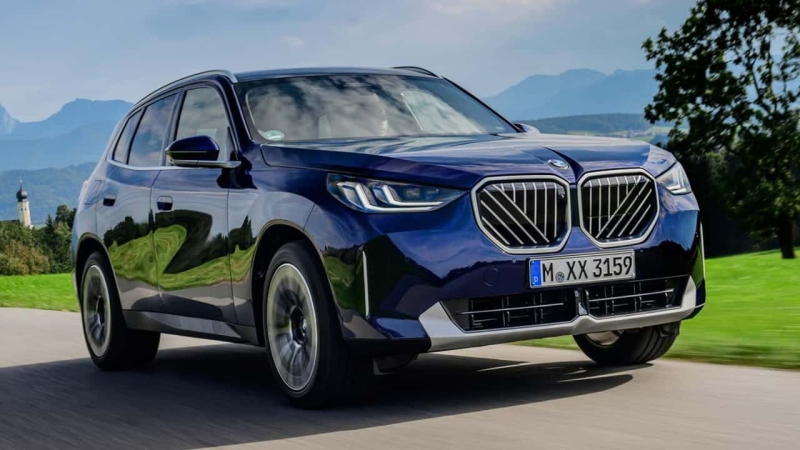Even with a new mild-hybrid engine, the X3 is the same excellent luxury SUV it’s always been.
BMW
Editor’s Note: Our colleagues at Motor1 Italy drove the new BMW X3 in Munich. Their review has been translated and adapted for publication on Motor1. Certain details like trims, powertrains, and pricing may be specific to the European model.
Three generations and 20 years of success—that, in a nutshell, is the BMW X3. The mid-sized luxury SUV has been nothing short of formulaic perfection for the German manufacturer since its debut. In 2023, it was still the brand’s best-selling vehicle globally, even though the third-generation model had already been on the market for seven years.
Now, however, it’s time to move on to the fourth-generation model and find out whether this new SUV has the credentials to continue the X3’s success. It has an evolved platform, updated styling, a tech-heavy interior, and electrified engines. But there’s so much more, of course; I went to Munich to see what this SUV was like firsthand.
| Quick Specs | 2025 BMW X3 (EU) |
| Engine | Turbo 2.0-Liter Four-Cylinder Mild-Hybrid |
| Output | 208 Horsepower / 243 Pound-Feet |
| Drive Type | All-Wheel Drive |
| 0-62 MPH | 7.8 Seconds |
| Base Price | €64,000 (EU) / $50,675 (US) |
One and a half inches. That’s how much the new BMW X3 has grown in length, now stretching out to 187.2 inches. The height (65.4 inches) and width (75.6 inches) are virtually unchanged. After all, this is still BMW’s CLAR platform for mid-to-high-end models, just with all-wheel drive and longitudinally arranged engines.
Yet, while the proportions remain true to the X3, the fourth-generation SUV’s design breaks away from the norm. For starters, there’s a new “double L” design at the base of the bumper, a first for the X3. The base model has a double kidney grille with a distinctive cross-slat design, which turns black on the M Sport trim.
The door handles sit flush with the bodywork (the whole aerodynamic element is actually very well done, with a Cd of 0.27), and the wheels go up to 21 inches. Finally, the split motif in the light clusters returns, and the shape of the bumper—flush with the tailgate, lacking the traditional step—jumps out at you. The exhaust tips are hidden right by the bumper, except for in the sporty M50.
Among all premium brands, BMW is the best at conveying a sense of perceived quality with its interiors. The new X3 is no exception. Plenty of room for luggage (31.5 cubic feet behind the second row and 67.1 cubic feet with it folded flat) and still more than enough room for rear passengers. Up front, the dashboard has a minimal and modern look.
Just a few physical buttons are gathered on the tunnel, while a generous compartment houses wireless smartphone charging as well as two USB-C ports, and a dual cup holder. The LED accents that surround it are lovely, and a bevy of color customization options allow you to choose between a more relaxing or sporty atmosphere. I wonder, though, if a cover here would help; That way objects would be hidden from prying eyes and protected from dust.
On the base version, the steering wheel has a slightly square shape. The leather covering the dashboard, seats, and door panels has a nice feel—and there is an option for non-animal-derived upholstery. A few details, however, can still be improved. The handle for closing the doors (the part you touch most) is made of hard plastic, and it would have been nice to have padding on the sides of the center tunnel, a place where you often rest your knees for hours.
The infotainment system is excellent, packed with dozens of features and apps, and equipped with over-the-air technology to keep them updated. Apple CarPlay and Android Auto are also cable-free. The 14.9-inch screen has excellent resolution and is easy to use with the rotary dial in the center of the tunnel. The digital instrument is customizable as needed, and measures 12.3 inches. And finally, with BMW’s smartphone app, you have complete remote control of your car.
I started the test drive with the new mild-hybrid version of the X3, the 20xDrive (Ed’s Note: This version of the X3 is not available in the US. The base X3 in the US is the xDrive30, which uses a more powerful version of the same powertrain). The “i” in the name is gone—now that’s exclusive to electric models (by the way, there won’t be an iX3 because a native electric SUV based on the Neue Klasse platform will debut in 2025). Here, there’s a turbocharged 2.0 four-cylinder engine making 190 horsepower, paired with all-wheel drive and an eight-speed automatic transmission.
The novelty lies in the presence of an electric motor, capable of adding 18 hp and 148 pound-feet of torque. It actively supports the gasoline engine by reducing emissions and lowering fuel consumption. This brings total power to 208 hp and torque to 243 lb-ft. Performance is brilliant: 0-60 miles per hour takes 7.8 seconds, with a top speed of 134 miles per hour.
The automatic transmission makes the system work synergistically. Restarts and acceleration are responsive, and allow smooth sailing with the engine at high speeds. The hybrid system’s battery recharges itself, taking advantage of decelerations, and thus, kinetic energy, or surplus torque from the gas engine.
The new X3 is very intuitive to drive, with just enough direct steering that you feel it in your hands right away. The optional adaptive suspension does excellent work, which, on an SUV of this size, manages to change dynamic behavior markedly. It offers excellent absorption on uneven ground and composure when you pick up the pace. In the latter case, the system is aided by all-wheel drive, which keeps the X3 neutral and controlled, capable of instilling a nice sense of confidence.
The X3 has a high and well-configured driving position and good visibility—although, the pillars at the base widen a bit. But an excellent sensor and camera assistance make city driving easier. In contrast, one appreciates the high-level soundproofing and driver-assistance calibration on the highway especially, another element of which modern BMWs excel. Annoying, however, is having to make multiple presses or dive into the touchscreen to change driving modes.
I also had a chance to try the sportiest X3: The M50. It has a 3.0 straight-six with 381 hp but, again thanks to the electric motor, total power rises to 398 hp and torque to 428 lb-ft. It takes just 4.6 seconds to reach 62 mph, and the top speed is limited to 155 mph.
Going slow is almost difficult. Everything is tuned perfectly for performance. The Motorsport division got its hands on the drivetrain, braking system, variable-ratio steering, and differential to make for a really enjoyable driving experience.
The BMW X3 starts at about €64,000 (Ed’s Note: The BMW X3 starts at $50,675 in the US with destination) for the base xDrive20 and rises to €68,000 and €70,600 for the M Sport and M Sport Pro trims. The very interesting xDrive20d, which combines the hybrid system with the 197-hp turbodiesel engine, starts at €65,900 and rises to €69,700 and €72,300 euros.
The plug-in xDrive30e, which promises electric mileage of up to 80 kilometers on the WLTP cycle, is priced at €71,000, while the M50—already in M Sport Pro trim—costs €90,000.
BMW AG.
Competitors
- Alfa Romeo Stelvio
- Audi Q5
- Mercedes-Benz GLC-Class
- Porsche Macan
- Volvo XC60
Get the best news, reviews, columns, and more delivered straight to your inbox, daily. Sign up For more information, read our
Privacy Policy and Terms of Use.
Gallery: 2025 BMW X3 (EU) First Drive Review
Source: BMW AG.
2025 BMW X3 (EU)
Engine Turbocharger 2.0-Liter Four-Cylinder Mild-Hybrid
Output 208 Horsepower / 243 Pound-Feet
Transmission Eight-Speed Automatic
Drive Type All-Wheel Drive
Speed 0-62 MPH 7.8 Seconds
Maximum speed 134 Miles Per Hour
Seating Capacity 5
Base Price €64,000 (EU) / $50,675 (US)
On Sale Now



